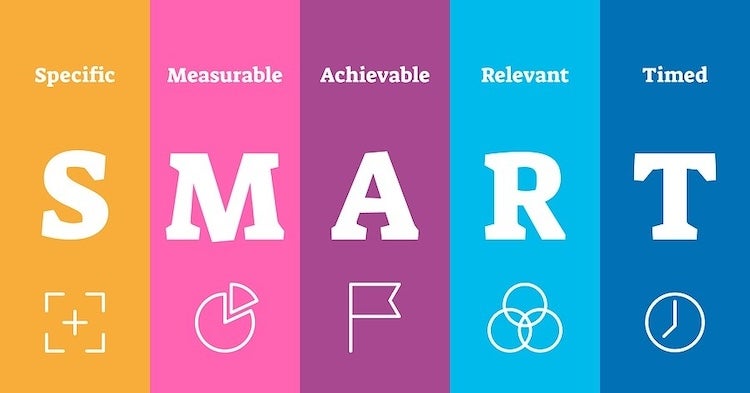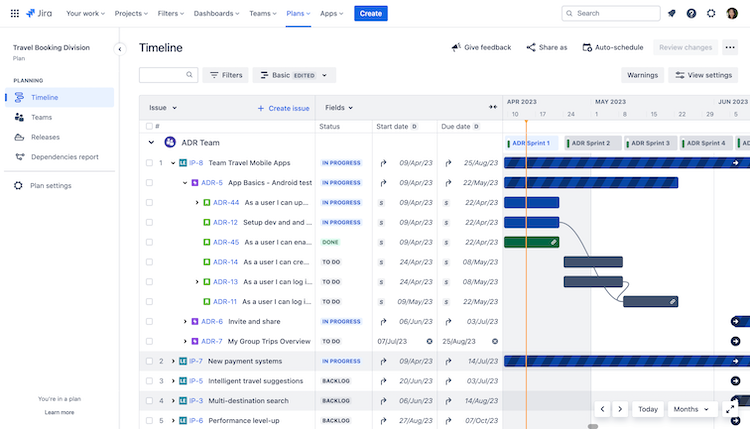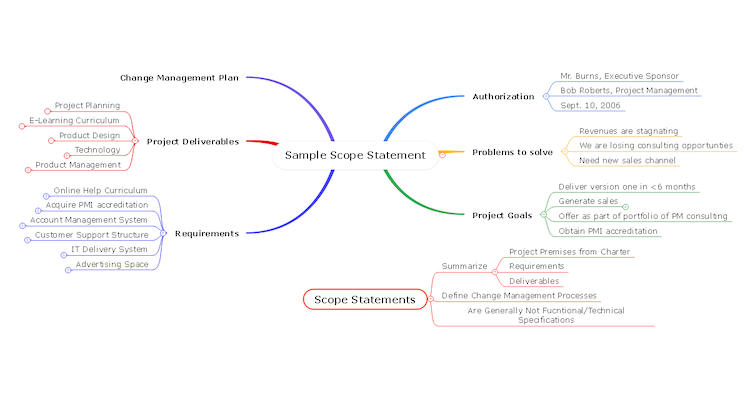Key takeaways
Whether you’re a new or an experienced project manager, the importance of delegation in project management can’t be overstated. You need to assign the right task to the right person, set realistic expectations, communicate clearly, and be a model of ownership and accountability.
12 Rules to Effectively Delegate in Project Management
Effective delegation fosters a collaborative environment that encourages individual team members to grow and succeed. This in turn increases productivity, earns trust, boosts morale, and grows the team’s sense of collective responsibility and shared achievements.
Delegation in project management starts by setting SMART goals or specific, measurable, attainable, relevant, and time-bound. Here are 12 rules for effective project management and task delegation.

Be specific
Clearly define each task before you start any project. It’s hard to motivate others if things are open-ended and poorly defined. Being specific eliminates ambiguity, sets clear expectations, and puts your team on the path for success. Specify deliverables, keep its scope attainable, and set clear start and end dates.
Assign the right tasks to the right people
Identify which team members have the best skills, experience, and strengths for each task. Consider their current workload and evaluate their past performance. Matching the right person to the right task not only gives your team the best chance at success, it also engenders a sense of ownership and accountability for individual team members.
Provide resources and authority
Delegation in project management isn’t just about spreading the work equally to the right people. You should supply your team with adequate resources, training, and authority to successfully complete their tasks. Provide them access to tools, information, and the support of other team members and relevant departments.
Set realistic expectations
Set expectations that are realistic and attainable by determining which goals are achievable based on scope, budget, and the capabilities of your team. Realistic expectations will help you and your team effectively manage the workload, allow the project to progress smoothly, and avoid burnout.
Empower decision-making
Ensure team members understand they have decision-making power so they are empowered to move things forward and sidestep potential bottlenecks. This will allow them to successfully complete their tasks and avoid unwanted or unnecessary delays, while fostering a sense of ownership and accountability.
Establish clear communication
Project progress might be affected if team members can’t get answers to questions or when the answers just make things more confusing for them. To successfully delegate in project management, you should establish effective communication strategies. Set up regular team checkins to monitor their progress, provide updates, and address emerging or ongoing concerns. Clearly define communication processes and protocol, including who will deliver progress updates, as well when and how they’ll convey them.
Read more: 27+ Essential Project Management Skills for Success
Provide feedback and support
Delegation in project management won’t bear much fruit if you don’t consistently provide feedback and support to your team. However, it won’t be received well or motivate them if it isn’t constructive and positive. While addressing any areas team members should improve upon, make sure you also recognize their achievements. Maintain an open feedback loop to encourage your team to continuously improve.
Be selective and disciplined
Avoid unnecessary scope creep by focusing on the most critical tasks. Discern what your team can do and refuse to accommodate unnecessary requests. Stick to the plan and scope you and the stakeholders agreed upon. Keep goals manageable and aligned with the objectives, and avoid adding or changing things in the middle of the project.
Be a model of accountability and ownership
When you delegate in project management, be a prime example of accountability and ownership. Follow through on commitments, own your mistakes, and encourage by creating a culture of trust and accountability. When you clearly define everyone’s role and responsibilities, you put the onus on them to complete their tasks on time and well. After all, you are ultimately responsible for whether a project succeeds or fails.
Encourage and motivate your team
Finding ways to encourage and motivate your team is vital to delegation in project management. Just as much as you need to empower your team to perform at their best, so too is it important to recognize individual efforts, celebrate successes, and open up opportunities for growth. Building an effective project team that is united in their drive to success will ultimately be more productive, engaged, and committed. Coaching them with support and encouragement will improve job satisfaction and performance.
Document everything
Proactively and consistently document all aspects of the project, from initial plans to final outcomes. This ensures clarity, accountability, and a reference for future projects. Comprehensive documentation helps manage unforeseen issues and allows for smoother transitions and handovers.
Monitor progress and adjust when needed
Change happens and you should be prepared to adjust goals, tasks, and assignments to ensure the project’s success. Regularly monitor progress and be ready to pivot strategies to keep the project on track. Being agile helps you and your team flexibly adapt to changes and manage unforeseen issues.
Benefits of Delegation in Project Management
Delegation in project management is a key to success in busy, ever-changing work environments. It is essential for meeting deadlines and staying on budget, and it delivers tangible benefits to you, your team, and your company.
Enhances team accountability
Effective project management delegation promotes a strong sense of ownership in your team members. Tying tasks to specific individuals empowers them to complete the tasks on time and encourages them to take the work seriously and deliver high-quality results.
Maximizes individual strengths
One of the core tenets of effective project management delegation is giving the right tasks to the right individuals. When you leverage an individual’s unique capabilities, team productivity and output quality improve.
Ensures project deadlines and budgets are met
If you are effective at delegating in project management, you will better meet deadlines and adhere to budgets. This leads to more efficient use of company time and resources, positively affecting their bottom line.
Empowers team development
Project managers who delegate well provide team members with opportunities to strengthen current skills, learn new ones, and gain valuable experience. Giving team members new, unique responsibilities will allow them to grow in their roles, bolster their confidence, and prepare them for future challenges.
Frees you up for strategic tasks
Your focus should ultimately be on planning, solving problems, and making decisions that will guide the project to success, while improving team efficiency and effectiveness. Freeing yourself up to do these higher-level, strategic tasks underscores the importance of delegation in project management for overall project success.
When to Delegate
There are many types and examples of projects where delegation is an essential part of project management. Recognizing these delegation opportunities will guide you to success.
- Delegate when there are team members who have the skills, knowledge, or expertise beneficial to completing specific tasks.
- Delegate so as to distribute tasks among team members to better balance their workload.
- Delegate when there are opportunities to develop your team’s skills and competencies.
- Delegate when you have high-level strategic planning and decisions on which you need to focus and concentrate.
- Delegate whenever you need your team to complete multiple tasks simultaneously for a tight deadline.
When Not to Delegate
While delegating in project management might seem like something you do all the time, there are occasions when it’s better not to.
- Do not delegate when you have tasks that require important decisions or that have far ranging impacts on the project’s direction or success.
- Do not delegate whenever you have a task with confidential, proprietary, or sensitive information that requires secrecy or discretion.
- Do not delegate tasks that require authority or access to resources that only managers have to team members.
- Do not delegate if there are tasks that have elevated risk or consequences where failure would be catastrophic.
- Do not delegate tasks that are beyond your team’s scope, skill, or knowledge.
Understanding the importance of delegation in project management will help you better discern when and when not to do it.
Delegation Tools
Here are eight project management tools and methods you can use to more effectively organize, manage, and delegate tasks.
Project management software
There are a lot of popular and widely used project management software solutions that allow you to effectively perform project management delegation. These include well-known products such as Jira, Trello, Asana, and Microsoft Project, which often come with helpful templates to get you started planning, organizing, and keeping track of delegated tasks.

Work breakdown structure
A work breakdown structure (WBS) is a tool that lets you break a project down into smaller, more manageable, iterative tasks. This allows you to more easily delegate and track tasks instead of taking on the whole project at once.
RACI chart
A RACI chart or RACI matrix clarifies what each team member’s role is in the overall project strategy—Responsible, Accountable, Consulted, or Informed. This helps you lean into a team’s experience and expertise to assign the right tasks to the most appropriate team members.
Program Evaluation and Review Technique
Program Evaluation and Review Technique or PERT chart is a project management delegation tool you can use to schedule, organize, and coordinate tasks among team members. This approach focuses on timeframes and dependencies and helps you identify the best path forward in the shortest possible time, letting you delegate tasks according to their duration and sequence in the project timeline.
Risk register
When you use a risk register, you identify and assess risks so you can better manage them. While you can’t anticipate all risks, using a risk register gives you a better chance at identifying most of them earlier, thus allowing you to proactively address them.
Read more: Risk Identification Techniques and Methods for Projects
Resource histogram
A resource histogram is a great way to delegate tasks by creating a graphical representation of resource distribution during a certain timeframe. Using this is a great way to equitably distribute work among your team and better balance workloads.
Decision matrix
Decision matrix is a project management term that refers to the tool used in evaluating options and prioritizing them based on specific criteria. Decision matrices involve creating a table where you score options against each criteria. This gives you a total score and provides a clear view of each option, which can help you identify and delegate the best tasks for each team member.
Mind maps
Mind maps are another useful way of visually representing a project’s tasks and responsibilities centered around the project’s core goals. This lets you see how all your tasks interconnect, helping you better delegate tasks among team members.

Conclusion
As a project manager, you can maximize your team’s productivity and provide a clear path to project success with effective delegation. You can do this by working with each team member’s individual strengths, communicating clear expectations, and empowering your team with resources and tools.
When you do this, you not only build trust and encourage collaboration, but you also free yourself up to perform more complex, higher-level tasks. Effective project management ensures outstanding project outcomes, while cultivating a team culture based on accountability and success.




![5 Best Mind Mapping Software to Organize Project Ideas [2024]](https://assets.project-management.com/uploads/2022/06/Three-Mind-Mapping-Tools-for-Project-Management.jpg)
